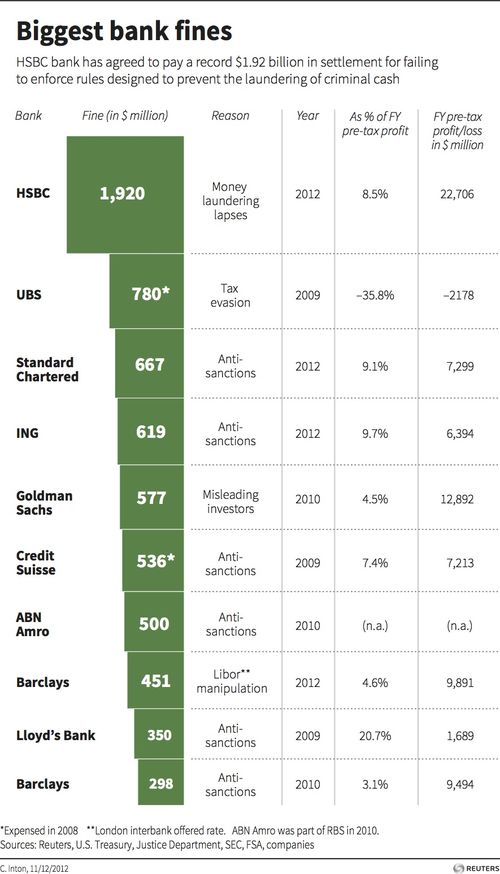
As we’re in the final countdown to the end of year celebrations,
it’s a good moment to reflect on what’s happened in 2012 in banking.
If 2010, the mantra was all about banker’s bonuses, bank
governance and bank risk; and 2011 was more about bankers not giving a damn about
their customers or society; 2012 is the year we have seen governments,
regulators and banks taking stock to change and, four years after the crash of
2008, we are seeing real change in banking.
In fact, there is radical change taking place from inside
and out.
Outside, the regulatory frameworks are starting to kick-in
with Dodd Frank, the European Market Infrastructure Regulation, Basel III and more
changing bank thinking. The implication
of a prop trading ban spreading from the USA to the other parts of the world is also changing thinking.
Add on heavy fines for money laundering, tax fraud and LIBOR, and banks are hurting.

Chart from Thomson Reuters blog
Finally, the mass investigation of insider trading that has
seen top figures from firms you would not even imagine being dragged into this
mire, such as McKinsey, and the world knows it has to change.
And it is changing.
For example, UBS has been fined on three occasions: $780
million for helping US citizens evade tax, $45 million for the losses created
by rogue trader Kweku Adoboli and now anything up to $1.6 billion for LIBOR
rigging. This is the same bank that got
the greatest fines ever imposed on a bank in the early 2000’s for laundering
money to Saddam Hussein (back then a stiff Fed fine was a mere $100 million)
and you can see why.
The result is that the bank has had serious issues for
years, with regular changes of CEO and Chairman and now a new direction to effectively become a pure wealth manager private
bank.
That means the bank is laying off thousands of people – 10,000
to be exact – and shutting down its investment bank.
This is one of the firms that used to be proud
Barclays has pretty much said that it’s going back to its
roots and shrinking its investment bank operations – rumours of 2,000 layoffs
are imminent – and most banks involved in trading are reassessing their
positions.
For example, the City has shrunk by a third over the last
five years. In 2007, London’s financial
services firms employed 354,000 people but, by 2012, the Centre for Economics
and Business Research estimates that the City jobs total has
fallen to 255,000 and predicts it will fall further soon.
Some of this is natural shrinkage, some relocation changes
but much of it reflects the dour state of investment banking.
City pay rates are dropping fast, with the average managing
directors of a City firm seeing their pay package fall by almost a third from
£237,000 to £167,000, according to recruitment firm Astbury Marsden.
So this part of the world that used to be like a casino is
now more like a Wild West, full of cowboys out to shoot each other.
The heady days of big bonuses, casino capitalism, easy money
and easy life are over.
So maybe 2013 will finally be the year when we stop bashing
bankers and start being a little bit more constructive about an industry that
needed to change and appears to finally be doing so.
Chris M Skinner
Chris Skinner is best known as an independent commentator on the financial markets through his blog, TheFinanser.com, as author of the bestselling book Digital Bank, and Chair of the European networking forum the Financial Services Club. He has been voted one of the most influential people in banking by The Financial Brand (as well as one of the best blogs), a FinTech Titan (Next Bank), one of the Fintech Leaders you need to follow (City AM, Deluxe and Jax Finance), as well as one of the Top 40 most influential people in financial technology by the Wall Street Journal's Financial News. To learn more click here...




















